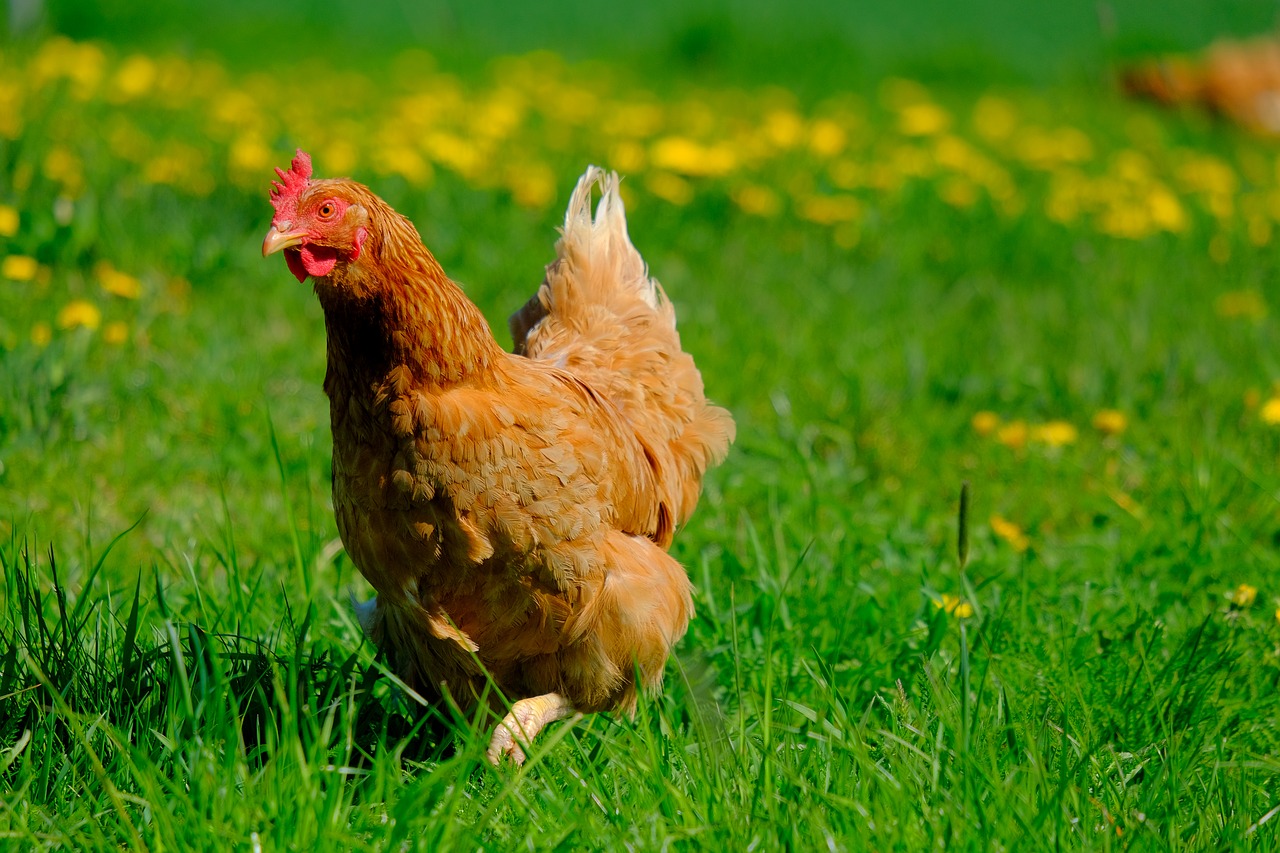Chickens are often regarded as the “must-have” form of livestock for your farm.
Why?
Not only are they excellent at producing eggs, but they can also be a wonderful source of meat, fertilizer, and free weeding services, too.
However, many people overlook the fact that chickens are also great companions to have on the homestead as pets.
These delightful creatures offer backyard chicken keepers the opportunity to learn a little bit more about sustainability and life itself – plus, you’ll be able to enjoy a wide variety of other rewards that no other pet can provide.
Ready to learn more?
Here are all the reasons why you should consider raising a chicken as a pet – as well as tips for getting started and the best breeds for you to consider.
Are Chickens Good Pets? 11 Reasons Why We Think YES!
Here are a few reasons why we believe that chickens make great pets:
1. They have awesome personalities
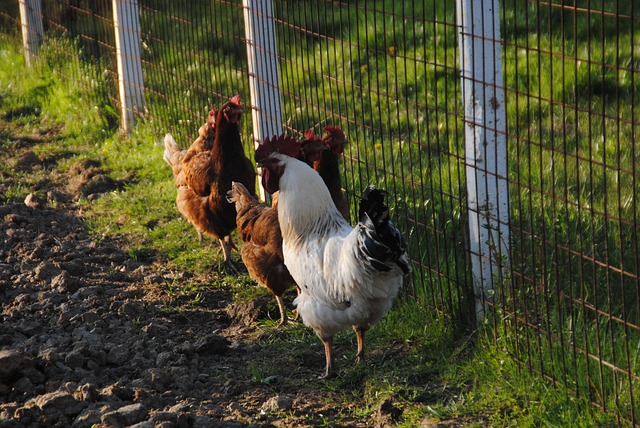
If you’ve ever interacted with a flock of chickens, you probably already know that each bird has a unique personality.
Each chicken will parade around with a variety of shapes, patterns, colors, behaviors, and quirks to showcase.
Many people name their backyard chickens and trust us, you’ll enjoy spoiling your chickens with treats and affection from time to time!
2. An endless supply of eggs!
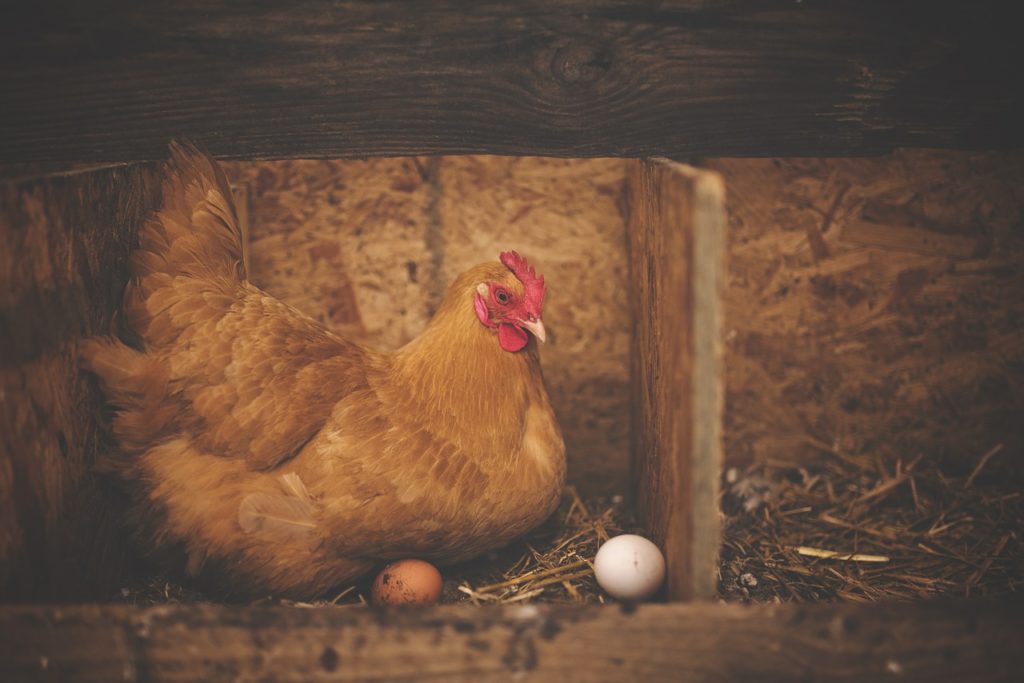
We all love having dogs, cats, fish, or even reptiles as pets. Yes, these animals offer plenty of affection and fun times.
However, what other pet can you raise that will give you something tangible in return?
No pet – other than the chicken, of course!
Once you’ve dined on freshly laid chicken eggs that are only minutes old – instead of being weeks or months old from the grocery store – trust us, you’ll never want to go back.
Plus, pasture-raised eggs (another way of saying eggs that are raised on green grass and sunshine, and are not the product of a factory-farmed chicken) are much better for you.
The yolks will be a vibrant orange instead of a pale yellow, a testament to the high nutrient content of the eggs.
They will contain higher levels of omega-3 fatty acids, vitamin D, vitamin E, and vitamin A.
They are also lower in saturated fat and cholesterol.
Ohm and know this – you don’t need to have a rooster in order to get eggs!
You might see a short decline or halt in laying during the cold winter months or when your birds are molting, but other than that, you can get eggs all throughout the year.
3. They offer free fertilizer for your garden
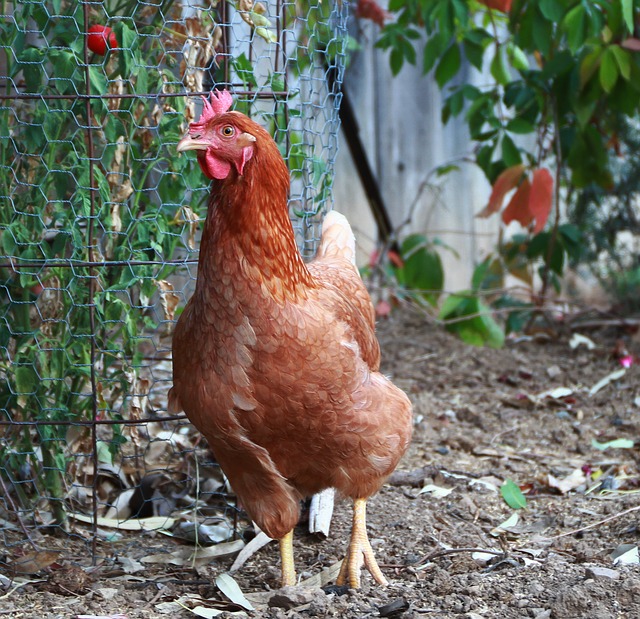
If you have a garden, you might have wondered how you can improve the health of your plants without having to add potentially harmful synthetic fertilizers, herbicides, pesticides, or other chemicals.
Lucky for you, a chicken offers more in return for a little bit of feed and attention than just eggs.
Chickens are also a great source of all-natural fertilizer!
Chickens love being able to free-range, and letting them engage in this natural behavior helps kill off unwanted pests on your lawn not only can chickens get rid of a variety of garden pests that can damage your plants, like grubs, earwigs, beetles, or even snakes and small rodents, but they’ll also turn their hard work into safe fertilizer.
While you will want to pay attention to how much chicken manure you are adding to your garden – as well as when you are applying it, as it is quite high in nitrogen and can burn your plants if applied too liberally – it is safe to use in any setting.
Plus, chickens love eating grass, so they’ll cut down on mowing and weeding you need to do.
They’ll gobble up worms, grasshoppers, ticks, and other pests you don’t want hanging around your lawn, too.
4. Anyone can have a small flock
No matter where you live, you can raise chickens.
While some areas have zoning laws that restrict the number of birds you can have and others put bans on roosters, there are very few other regulations about raising backyard chickens.
This is much different than if you were to raise other forms of livestock, like goats or pigs, who are difficult to raise in a small amount of space.
5. They provide inexpensive pest control
We already mentioned that chickens will get after bugs in your garden – but they truly know no bounds and will take care of pests around the rest of your property, too.
Chickens will eat everything from crickets to ants to mosquito larvae – and you don’t need to train them to do this, either. It’s all instinct!
They will even eat everybody’s least favorite pests – spiders, snakes, and mice.
Chickens are obligate omnivores, so anything they can get inside their beaks, they’ll eat.
Plus, unlike some other pets (whose name we need not share), they won’t feel the need to drag their feast to your doorstep to show it off to you, either.
6. They are awesome if you have small children
Raising a flock of chickens is a great way to instill positive values in your children.
They can help your kids learn more about responsibility as well as the value of hard work.
When you raise chickens, you get to reap the rewards of your hard work every single day – once your kids see how caring for an animal can produce some major benefits, they’ll learn that there are some things in life that are just worth doing yourself.
If you have a pet chicken, it can also help teach your kids a little bit more about the value of life.
Not only are they inexpensive, but they’re one of the easiest and quickest pets to raise from childhood to adulthood – in the process, they can teach your kids a lot about basic biology, avian behavior, and the circle of life.
7. They give you something to do with your leftovers
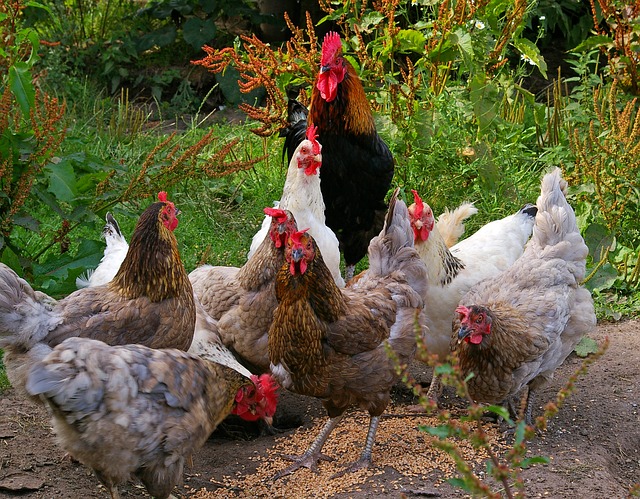
Have you ever made a meal and thought, “Ugh. Not my best work.”
Chances are, you probably felt guilty about throwing it in the trash, but then were forced to let it rot in the refrigerator because you kept telling yourself you didn’t want to waste food – even though nobody was ever going to eat it.
Chickens offer a great solution to this common dilemma.
You don’t have to feel guilty about letting your food rot in the fridge or throwing out unwanted leftovers.
You can feed chickens just about any kind of leftover (yes, including meat!) that you don’t want.
You will just want to be wary about feeding your chickens leftovers like uncooked eggs, onion, garlic, chocolate, or food that is too rotted, salty, sweet, or moldy.
8. They’ll perform double-duty in cleaning up your garden
If you have a large vegetable garden, cleaning up at the end of the growing season can be nothing short of a daunting task.
And from pulling weeds to adding mulch, removing old plant matter and turning your compost, the list of chores you have throughout the year can be exhausting.
Chickens can help make light work of these chores.
They will get right into your compost bin and turn it for you, searching for yummy microorganisms and bugs as they aerate your pile for you.
They will eat weeds that grow among your plants – but know that you will need to be careful, as they will eat other types of garden plants (like your beans!) too.
Chickens will even help you at the end of the season.
Let them free range in your garden for a few days, and they will till up the soil, turning under any weed seeds or dead plants.
They will also eat any leftover plant matter or fruits, and they’ll fertilize your garden for free in the process.
9. They’re low-maintenance and inexpensive to raise
In many ways, chickens are much easier to care for than other types of pets, like dogs or cats.
They don’t need to be walked or groomed (although if you are raising chickens for exhibition purposes, you may have to do some clipping or cleaning every now and then).
You don’t even have to feed them twice a day!
If you have auto- or gravity-feeders and waterers, you may need to fill hoppers and drinkers only once a week (or even less).
Anybody can own a flock in the backyard.
You don’t have to invest in veterinary fees in most cases, and any expenses you do have can be offset by selling some of your extra eggs.
They are no more work than raising a dog and a cat but it’s much easier to take a vacation or trip away from home when you raise chickens.
All you need is somebody to come check on the birds and refill their food once or twice a week while you’re gone. Talk about a low-maintenance pet!
10. You can have more control over where your food comes from
If you’re hoping to engage in a more sustainable way of living, there’s no better way to do that than to invest in a flock of chickens – or even just one chicken! – for you to raise at home.
You won’t need to pay money for eggs shipped from halfway across the country.
You won’t have to contribute as much waste to the landfill, either, since you can feed a lot of your garden and kitchen waste back to your chickens.
If you want to know exactly where your morning eggs are coming from, raise chickens.
There are a lot of benefits to this knowledge, including the fact that you won’t have to worry about whether your chicken was raised ethically or exposed to various chemicals during its life.
Plus, chickens who are raised commercially are often raised in poor conditions.
These birds are often subjected to cramped quarters – even those who are supposedly raised in “cage-free,” “organic,” or “free-range” settings. Not so when you are raising your own backyard pet chicken.
Want food that is not genetically modified? Raised cruelty-free? Organic. You’ve got it.
You get control over every aspect of the process, and there’s definitely something to be said for that.
11. Yes, they can be trained!
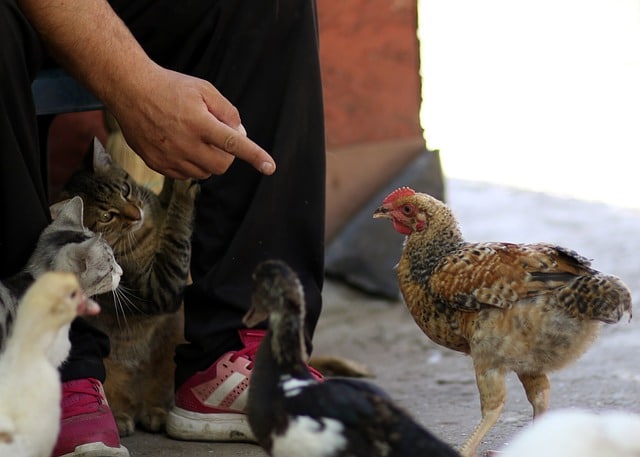
Chickens are very intelligent, despite some popular beliefs that they are not.
Chickens are fairly easy to train and taught to do tricks – in some cases, you can even teach them to do things on command.
Chickens even have the ability to recall and recognize hundreds of different faces.
All you need is lots of treats and a little bit of patience!
Best Breeds to Raise as Pets
If you are looking for a breed of chicken that will help you make the most of the sustainable lifestyle, these are some of the best options for you to consider.
- Silkies: These chickens are affectionate, loving, and quite cuddly, too! As fuzzy-feathered birds that are quite small, they aren’t known for being terrific egg layers of meat producers – but they do make excellent pets.
- Barred Plymouth Rocks: Another gorgeously feathered bird, this chicken is calm, friendly, and inquisitive. It will also lay a ton of eggs for you, producing up to 250 eggs each year.
- Orpingtons: Orpingtons are perfect for backyard chicken coops as they are not only great egg layers, producing up to 200 eggs each year, but they also love to be held and to be fawned over, too.
- Australorps: These chickens are great layers and they’re also good with children. They look beautiful, too, with glossy black feathers.
- Cochins: These chickens are small and do well in confinement. They are low-maintenance, too.
- Wyandotte: Wyandottes have some of the most interesting personalities and do quite well in confinement. They are great mothers and are extremely gentle, making them great birds to have as pets.
- Polish: Polish chickens aren’t great egg layers by any means, but they are certainly quite interesting to look at! These chickens have beards and large poufs of feathers atop their heads. They are extremely docile and great to have in a backyard flock.
Other options to consider include Brahmas, Easter Eggers, Delawares, and Rhode Island Reds. Bantam breeds are usually good options, too.
Tips for Raising a Chicken as a Pet
Thinking about raising chickens as pets? Here are a few tips:
Let them socialize
You might want to consider arising more than just one backyard chicken.
These birds can live for up to ten years, so it’s important that you provide them with a good quality of life in the meantime.
Chickens are social animals and like to be around others of their own kind.
Consider raising a handful (at least six) of birds to help keep them entertained.
This is what most people do anyway, as most hatcheries require you to purchase a set number of birds to help them stay warm during shipping.
Most chickens will get along fine with each other, but remember that the pecking order is something to be aware of.
Chickens are not welcoming of new members, so it’s best to start your flock together all at once.
In addition, you are going to need to keep an eye on your other household pets, too.
Some dogs can do just fine with chickens as long as they are given ample training. Others will never get along with your chickens.
Give good housing
We already mentioned that raising a chicken is not expensive.
This is true – but make sure you don’t skimp on costs when it comes to building a chicken coop.
This is really the only major expense you will have in raising chickens, and it’s a one-time cost that you can easily make up for once you start selling (or even just consuming) your farm fresh eggs.
When you design your chicken coop, make sure it is protected against predators.
Chicken wire often isn’t enough – raccoons can easily get through chicken wire, so you will need to use another form of predator proofing, like heavy welded wire.
The coop itself should have at least four square feet of space per chicken, along with spots for roosting, nesting, and food and water.
Provide plenty of good ventilation along with an outdoor run for at least 10 square feet per bird.
You will also need a way to shut your chickens up inside the coop every night.
Most breeds of chickens can survive winter temperatures, but you may need to implement a system to prevent your water from freezing.
Otherwise, shutting them up in the coop at night just helps protect them against predators.
You can do this by hand or you can invest in an automatic door opening and closing system.
Make sure you feed them a proper diet
Chickens need fresh water and food – that’s nothing revolutionary, right?
While you can feed your chicken a basic commercial feed, you should make sure you have dialed into the stage of life that your chicken is in so you can provide the optimal levels of nutrition.
Baby chicks, for instance, need more protein in their diets, while laying hens need more calcium. Talk to your local feed store about which options are best for your birds.
Know that housebreaking will be next to impossible
There are some people out there who claim that they have been able to housebreak their chickens, but in most cases, this will be impossible.
Even if you are able to train your chicken to be housebroken, it’s not recommended.
Chickens poop – and they poop a lot – and when they do this, they will leave behind tons of nitrogen-rich fertilizer. You don’t want this on your carpet or kitchen counter, to say the least!
Although there are some companies that specialize in making chicken diapers, this isn’t something you want to get involved with.
Not only is it unpleasant to change a chicken diaper, but chicken manure contains salmonellosis, a dangerous bacterium responsible for serious disease salmonella.
It can easily be transmitted to humans and it’s quite dangerous for young children, elderly people, pregnant women, and the immunocompromised.
Therefore, chickens are best raised outside. They can still be your pets, but you do need to keep a bit of a safe distance.
Interact with them every day
Keep an eye on your chickens and try to interact with them each and every day.
This will give you some insight into their personalities as well as their behaviors so that you will be aware if something goes wrong.
Over time, you will get to know the meaning behind the different vocalizations that your chickens make.
You will also know which behaviors are normal for your chickens and which are signs of problems in the flock.
Keep things clean
Make sure you clean your chicken coop every few weeks.
You can employ the lazy man’s technique for cleaning a coop – a method of heavily bedding the chicken coop so you don’t need to replace it as often but instead will add more bedding – known as the deep litter method, or you can scrape out all the gunk once a month or so.
Either way, keeping your coop clean and filled with new, fresh bedding will help your birds stay healthy and happy.
You can prevent quite a few chicken diseases and health problems simply by maintaining a hygienic living area.
Plus, then you won’t have to worry about dirty eggs every time you collect them!
Is a Pet Chicken Right For You?
Whether you’re considering raising a pet chicken because you want a pet that is low-maintenance or because you want one that will provide your family with an endless array of benefits, the noble yet mighty chicken might be a good choice for you.
With dozens of fun-loving, beautiful breeds to choose from, why would you invest your time and money in raising any other kind of pet?
